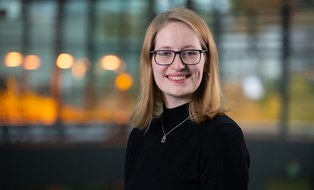Sandra Mooshammer // Fähigkeiten und journalistische Qualität des Kommunikators Automated Journalism und ihr Einfluss auf die Wahrnehmung der Technologie durch menschliche Journalisten
Inhaltsverzeichnis
 © Kretzschmar/TUD
© Kretzschmar/TUD
Kollegiatin
NameSandra Mooshammer
Eine verschlüsselte E-Mail über das SecureMail-Portal versenden (nur für TUD-externe Personen).
Besuchsadresse:
Z21, Raum 302B Zellescher Weg 21
01217 Dresden
Büros: 3. Obergeschoss, Konferenzraum: Erdgeschoss
Promotionsvorhaben: Fähigkeiten und journalistische Qualität des Kommunikators Automated Journalism und ihr Einfluss auf die Wahrnehmung der Technologie durch menschliche Journalisten
Fachgebiet: Kommunikationswissenschaft
Betreuender: Prof. Dr. Lutz Hagen
„The Rise of the Robot Reporter“, so betitelt es die New York Times. Künstliche Intelligenz zieht in den Journalismus ein und kann mittlerweile aus komplexen Daten eigenständig journalistische Texte erzeugen, Tonalität und Erzählstruktur variieren oder sogar multimedialen Content generieren. Der sogenannte Automated Journalism verändert die Art und Weise, wie journalistische Inhalte produziert und konsumiert werden. Fraglich ist dabei: Was kann KI wirklich? Welche Qualitätskriterien gelten dafür? Und wie wandelt sich dadurch der Journalismus?
Diesen Fragen soll sich dieses Dissertationsprojekt widmen. Als theoretische Grundlage dient dabei die Human-Machine Communication, die Maschinen als eigenständige Kommunikatoren konzipiert – eine Rolle, die bisher in der Kommunikationswissenschaft weitgehend dem Menschen vorbehalten war. Ausgehend davon wird das Spannungsfeld zwischen klassischen menschlichen und neuen technischen Kommunikatoren betrachtet.
Dazu werden verschiedene Methoden und Forschungsansätze genutzt. Zunächst soll durch Literaturarbeit und Experteninterviews analysiert werden, welche Gütekriterien für die Beurteilung von Automated Journalism herangezogen werden können und welche qualitativen Abstufungen dabei erreicht werden (können). Anhand dieser Klassifikation können verschiedene Profile von maschinellen Journalisten erstellt und menschlichen Journalisten vorgelegt werden. Zum einen soll dadurch herausgefunden werden, in welchen Bereichen die Journalisten große Unterschiede oder aber große Gemeinsamkeiten sehen. Zum anderen kann dadurch ein Einblick gewonnen werden, inwiefern beide Kommunikatoren konkurrierend oder eher komplementär zueinander stehen. Letztendlich kann dadurch nicht nur ein Beitrag zum jungen Forschungsfeld der Human-Machine Communication geleistet, sondern zudem Einsichten in die Zukunft des Journalismus in Zeiten der künstlichen Intelligenz gewonnen werden.
Curriculum Vitae
| 2019-2020 | Tutorin am Institut für Kommunikationswissenschaft, TU Dresden |
| 2018-2020 | M.A. Angewandte Medienforschung, TU Dresden |
| 2015-2018 | Studentische Hilfskraft im Bereich Printjournalismus, HS Ansbach |
| 2014-2018 | B.A. Ressortjournalismus, HS Ansbach |
Weitere Veröffentlichungen, Präsentationen, Aktivitäten, etc.
s. Forschungsinformationssystem der TU Dresden
Auszeichnungen
- Gewinnerin des Best Paper Award auf der CONVERSATIONS 2021
- 2. Platz bei der Auszeichnung der besten Projekte der StuFo Expo 2021 (TU Dresden)
-
1. Preis für die beste Nachwuchseinreichung: DGPuK 2023. (Beitragstitel: Er, sie... oder was? Vertrauen in geschlechtsneutrale Sprachassistenten)
